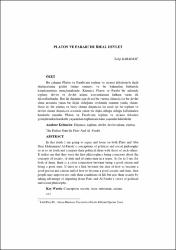Platon ve Farabi’de İdeal Devlet
Özet
Bu çalışma Platon ve Farabi’nin toplum ve siyaset felsefesiyle ilgili
düşüncelerini gözler önüne sermeyi ve bu bakımdan birbiriyle
karşılaştırmayı amaçlamaktadır. Kanımca Platon ve Farabi bir anlamda
toplum, devlet ve devlet adamı kavramlarının farkına varan ilk
filozoflardandır. Her iki düşünür için de iyi bir yurttaş olmayla iyi bir devlet
olma arasında yakın bir ilişki olduğunu söylemek sanırım yanlış olmaz.
Nasıl iyi bir yurttaş ve birey olunur düşüncesi ile nasıl iyi bir toplum ve
devlet olunur düşüncesi arasında yakın bir ilişki olduğu olduğu kabulünden
hareketle insanlar Platon ve Farabi’nin toplum ve siyaset felsefesi
görüşlerinden hareketle yaşadıkları toplumları daha yaşanılır kılabilirler. In this study I am going to argue and focus on both Plato and Abu
Nasr Mohammad Al-Farabi’s conceptions of political and social philosophy
so as to set forth and compare their political ideas with those of each others.
It strikes me that they were the first philosophers being conscious about the
concepts of society, of state and of states man in a sense. As far as I see, for
both of them, there is a close connection between being a good citizen and
being a good state. If there is a link between the idea of how to become a
good person and citizen and of how to become a good society and state, then
people may improve not only their conditions of life but also their society by
taking advantage of departing from Plato and Al-Farabi’s views of political
and social philosophy.
Cilt
6Sayı
2Bağlantı
http://hdl.handle.net/11630/3439Koleksiyonlar
- Cilt 6 : Sayı 2 [18]



















